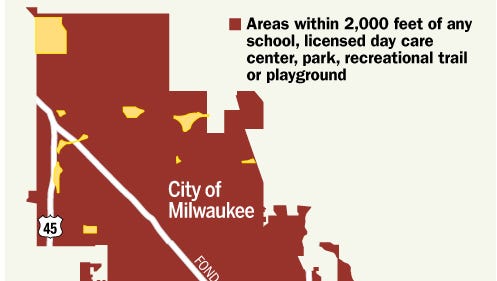- Joined
- May 6, 2016
- Messages
- 1,908
- Reaction score
- 489
- Location
- Colorado
- Gender
- Male
- Political Leaning
- Independent
It all started in 1993 with the passage of the Wetterling Act. This act of congress called upon states to require people who committed sex crimes against minors to register their current address with law enforcement for 10 years. The registry wouldn't be available to the public until the high profile murder of Meghan Kanka. A month after her death in 1994, the state of New Jersey passed a law which notified the community whenever a sex offender moved into the neighborhood. A year later, this law made its way to the federal level. It required states to make the registry available to the public. It does not specify how states are required to make said notification available (could be through newspaper or the internet). Once again, sex offenders should be on the registry for 10 years. The Adam Walsh Act which is also known as the Sex Offender Registration and Notification Act (SORNA) became the next step. It created a 3 tier system. Tier 1 offenders are on the registry for 10-15 years, tier 2 is 25 years, and tier 3 lasts 25 to life. Whether someone is registered as a sex offender and what tier they end up in is based not on the risk of offending but on the offense itself. The act also allowed federal judges to sentence offenders to civil commitment if (in theory) it can be proven that the offender attempted to engage in rape or child molestation, is mentally ill, and would have trouble not reoffending if released.
State governments often went beyond what the federal government mandated. In many cases, people who were sentenced in a lower tier found themselves in a higher tier. An Ohio study found that while previously most offenders were in the least restrictive tier, the majority eventually found themselves in the third tier. Some states also imposed residency restrictions which prohibited sex offenders from living within a certain distance of a place "where minors may gather" which includes schools, parks, malls, theaters, etc. And when state governments didn't, local governments often did. In some places, there was almost nowhere in the city that sex offenders could live. This was the case in the City of Milwaukee.

And if sex offenders happen to be living in a prohibited area already and cannot afford to get a new place, they end up homeless. In Miami Florida (where the registry is especially strict), there was a settlement of sex offenders living under the Julia Tuttle Causeway. Under Miami law, sex offenders cannot live within 2,500 feet of a school, bus stop, park, or homeless shelter. In practice, this meant that sex offenders could only live in the Miami Airport or the Florida Everglades.

 en.wikipedia.org
en.wikipedia.org
Now maybe all of this would be justifiable if it actually worked. In 1994, when the sex offender registry was just getting started, the DOJ conducted a 5 year study of inmates getting released. They found that although property criminals had very high recidivism rates (70-80%), only 5% of rapists were arrested again for another rape. Murderers also had a low rate of 1.2%.
The DOJ did another study lasting from 2005 to 2014 with similar results. 67% of those who finished serving time for a sex offense ended up behind bars again. That was lower than for property, drug, and public order offenses which were in the 80s. Although 67% is certainly a majority, most of them were not for sex offenses. 24% went back for a property crime, 18.5% for drug crimes, and 59% for public order crimes (which makes sense once you realize that it includes parole and probation violations). Only 7.7% of released sex criminals were rearrested for another sex crime.

 www.prisonpolicy.org
www.prisonpolicy.org
*End of part 1*
State governments often went beyond what the federal government mandated. In many cases, people who were sentenced in a lower tier found themselves in a higher tier. An Ohio study found that while previously most offenders were in the least restrictive tier, the majority eventually found themselves in the third tier. Some states also imposed residency restrictions which prohibited sex offenders from living within a certain distance of a place "where minors may gather" which includes schools, parks, malls, theaters, etc. And when state governments didn't, local governments often did. In some places, there was almost nowhere in the city that sex offenders could live. This was the case in the City of Milwaukee.

Milwaukee Common Council votes to lift sex offender residency restrictions
The measure repeals residency "buffers," meaning that sex offenders could basically live anywhere in the City of Milwaukee.
www.jsonline.com
And if sex offenders happen to be living in a prohibited area already and cannot afford to get a new place, they end up homeless. In Miami Florida (where the registry is especially strict), there was a settlement of sex offenders living under the Julia Tuttle Causeway. Under Miami law, sex offenders cannot live within 2,500 feet of a school, bus stop, park, or homeless shelter. In practice, this meant that sex offenders could only live in the Miami Airport or the Florida Everglades.

Julia Tuttle Causeway sex offender colony - Wikipedia
Now maybe all of this would be justifiable if it actually worked. In 1994, when the sex offender registry was just getting started, the DOJ conducted a 5 year study of inmates getting released. They found that although property criminals had very high recidivism rates (70-80%), only 5% of rapists were arrested again for another rape. Murderers also had a low rate of 1.2%.
The DOJ did another study lasting from 2005 to 2014 with similar results. 67% of those who finished serving time for a sex offense ended up behind bars again. That was lower than for property, drug, and public order offenses which were in the 80s. Although 67% is certainly a majority, most of them were not for sex offenses. 24% went back for a property crime, 18.5% for drug crimes, and 59% for public order crimes (which makes sense once you realize that it includes parole and probation violations). Only 7.7% of released sex criminals were rearrested for another sex crime.

BJS fuels myths about sex offense recidivism, contradicting its own new data
A new government report reinforces harmful misconceptions about people convicted of sex offenses. Here's our take on how to parse the data.
*End of part 1*

